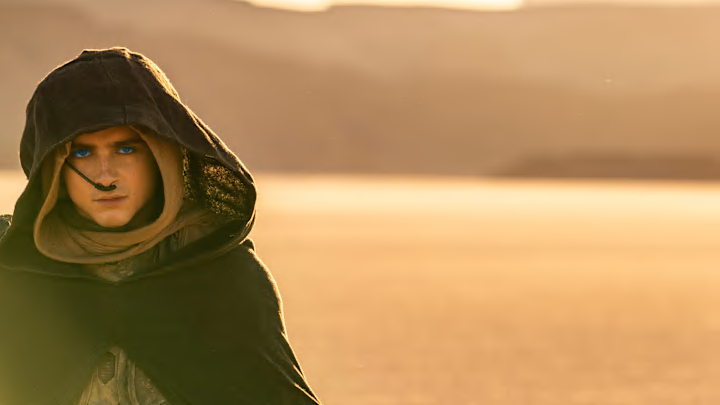1. Dune: Why the first book is the best one

Dune is not only the first book in the series, but also the best one in my opinion. Dune is a masterpiece of science fiction that combines adventure, politics, religion, ecology, culture, and philosophy in a captivating story that transcends its genre.
Dune tells the story of Paul Atreides, the young heir of a noble family that is sent to rule over the desert planet of Arrakis, also known as Dune. Arrakis is the only source of the spice melange, a substance that grants enhanced abilities and longevity to those who consume it, and is therefore the most valuable commodity in the galaxy. However, Arrakis is a harsh and dangerous world inhabited by giant sandworms and fierce nomads called Fremen. Paul soon finds himself caught in a deadly conflict between his family and their enemies, the corrupt House Harkonnen, who plot to destroy them with the help of the emperor. Paul must survive the treachery and violence that surround him while also awakening to his destiny as the messiah of the Fremen and the leader of a galactic revolution.
The book is full of memorable characters, such as Duke Leto, Lady Jessica, Baron Harkonnen, Thufir Hawat, Gurney Halleck, Stilgar, Chani, and Liet-Kynes, and features some of the most iconic scenes in science fiction, such as the Gom Jabbar test, the sandworm ride, and Paul's duel with Feyd-Rautha Harkonnen. Dune is a book that can be read multiple times and still offer new insights and experiences. It is the ultimate Dune book and one of the greatest books of all time.
One of the reasons why I love Dune so much is because it explores many philosophical concepts that are relevant to our own world and time. For example, Dune deals with the themes of ecology and environmentalism, showing how human actions can affect the balance and harmony of nature. Dune also examines the role of religion and prophecy in shaping human history and destiny, questioning whether we are free to choose our own path or are bound by a predetermined plan. Dune also challenges our notions of power and leadership, asking what makes a good ruler and what are the consequences of tyranny and oppression. Dune also delves into the mysteries of consciousness and perception, showing how different perspectives can alter our understanding of reality and ourselves.
One of my favorite moments from the book is when Paul undergoes the spice agony, a ritual that allows him to access his genetic memory and awaken his prescient vision. In this scene, Paul experiences a profound transformation that changes him forever. He sees his past lives and his future possibilities, he sees the patterns and forces that shape the universe, he sees his role in the cosmic scheme. He becomes Muad'Dib, the Kwisatz Haderach, the one who can be many places at once. He becomes more than human.
Here is an excerpt from this scene:
"He found that he could no longer hate the Bene Gesserit or the Emperor or even the Harkonnens. They were all caught up in their own patterns within patterns. They were all trapped within their own destinies. He felt pity for them. And he sensed their pitiful awareness trapped within his own mind. He felt like laughing at himself.
He was suddenly aware that he was not seeing with his eyes but with some other sense. He saw his own body lying there on its back on a low dais.
He saw Jessica standing beside him holding his hand.
He saw Chani kneeling at his feet.
He saw Stilgar standing guard at his head.
He saw Harah holding Alia.
He saw them all within a globe of light.
And he saw around him people he did not know but recognized as friends.
And he saw around them people he did not know but recognized as enemies.
And he saw around them people he did not know but recognized as neutrals.
And he saw around them people he did not know but recognized as unknowns.
And he saw around them all a vastness that defied measurement.
And he knew with a certainty that surprised him that he was seeing infinity."
This passage shows how Paul transcends his ordinary human limitations and becomes something more. He sees beyond space and time. He sees beyond good and evil. He sees beyond himself.
Dune is a book that has inspired me and many others to think deeper and wider about our world and ourselves. It is a book that challenges us to question our beliefs. It is a book that invites us to imagine and create new possibilities. It is a book that deserves to be read and reread by anyone who loves science fiction and literature.
If you have not read Dune yet, I urge you to do so. You will not regret it. And if you have read Dune, I hope you will join me in celebrating its greatness and sharing its wisdom with others.
I would love to hear your thoughts and opinions on Dune and its sequels. Until next time, may the spice flow!
To stay up to date on everything fantasy, science fiction, and WiC, follow our all-encompassing Facebook page and sign up for our exclusive newsletter.
Get HBO, Starz, Showtime and MORE for FREE with a no-risk, 7-day free trial of Amazon Channels
